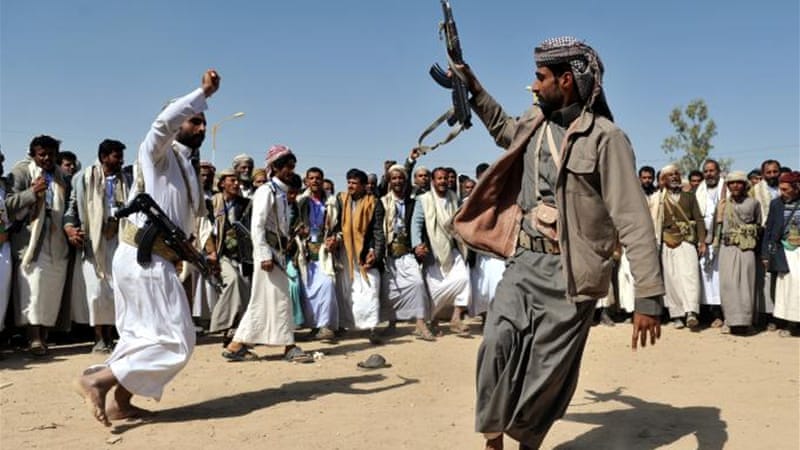Yemen is home to one of the most severe civil wars today, comparable to that of Syria. Since 2015, Yemen has been devastated by strife between both internal and external actors. Within the country, the Houthi rebels oppose the current government led by President Ali Abdullah Saleh. A Zaidi minority sect of Shia Islam, the Houthis have gained key supporters, most notably Iran and Hezbollah. In the past, these two groups have denied any interaction with the Houthi rebels; however, such interaction seems to be becoming undeniable as President Saleh of Yemen personally denounced Iranian involvement.
Allegations of the Houthis’ foreign assistance from Iran and Hezbollah began shortly after the outbreak of the civil war. Both viewed the Yemen conflict as an opportunity to influence the region through supporting a Shia partner. Yemen is an example of a proxy war, where external actors join sides in order to promote their foreign agenda. For Iran and Hezbollah, this agenda is to spread Shia-dominated governments in order to offset the threat posed by Saudi Arabia, a Sunni majority country. Largely, the international community has declared such backing from Iran and Hezbollah to be in the form of weapons as well as military advice.
One of the main concerns regarding the situation in Yemen is the Houthis’ increasing use of missiles. Particularly, the Houthis have been launching missiles against Saudi Arabia, striking key areas. On July 22, 2017, the Houthis launched a Volcano H-2 missileat Saudi Arabia, targeting oil refineries in the Yanbu Province. There have been multiple suspicions of links between the Houthis and Iran and their missile technology transfer. According to the Missile Defense Advocacy Alliance, the main missiles used by the Houthis, the Burkan-1 and Burkan-2, are almost exact replicas of an Iranian missile, the Qiam-1.
Along with sending missiles, the international community holds Iran responsible for Yemen’s anti- missile system which protects Houthi assets from Saudi weapons. On January 12, 2018, there was a leak of a United Nations report which confirmed the Houthis’ missiles being of Iranian origin. The report indicated that remnants from missiles and other military components came from Iran following the “targeted arms embargo” on Yemen in 2015.
Also, four boats from Iran carrying infantry weapons have been intercepted in the Arabian Sea by navies from Australia, France, and the United States. An example of this was the Jihan 1 Shipwhich was seized by the Yemeni government in 2013. The ship was delivering Iranian weapons to the local insurgents in Yemen.
Although not yet verifiable, top Iranian officials have also declared their support for the Houthis. In Yemen, there are approximately300Quds forcespresent in order to train the Houthi rebels. The Quds is a branch of Iran’s Revolutionary Guard. According to the same military officer, Houthis have also traveled to the Quds training base in Iran near the city of Qom. It is also possible that Iranian support increased for the Houthis upon their successful capture of cities such as Sana’a.
There have also been internal claims of ties between Hezbollah and the Houthis since 2017. Perhapsmost substantially, Houthi leader Abdul Malik Badreddine al Houthiexpressed his allegiance to Hezbollah in the fight against Israel. The Hezbollah training has been labeled operation “Impair Saudi Arabia”, as their main goal is to disrupt the Sunni base in the region. Overall, the training is focused on future operations in Saudi Arabia, such as missile launches, made possible by Iranian weapon shipments. In addition, Hezbollah engaged in guerilla-like training with the Houthis including plans for assassinating prominent figures in Riyadh.
One of the key reasons for Hezbollah’s influence on the Houthis is the creation of Hezbollah Troop 3800. Modelled after the Iranian Quds Force, Hezbollah troop 3800contains men who “swore to uphold the Iranian regime’s quest to spread its revolution to foreign lands”. Furthermore, this troop in particular is so effective in its training of the Houthi rebels because its members are both highly educated and could speak in the native dialect of Yemeni Arabic.
On August 29, 2018, Yemen’s Human Rights Officer, Mohammed Askar, condemned the behavior of Iran stating that it has contributed to the mass human rights violations in Yemen. Furthermore, Askar blamed Iran for undermining the security of Yemen in order to advance its own political agenda. As claims such as these continue and evidence is brought to the forefront, the question of Iranian and Hezbollah support for the Houthis remains.
Support from Iran and Hezbollah for the Houthi rebels is only complicating U.S. endeavors in the Middle East. As the U.S. continues an interlocked relationship with Saudi Arabia, it is moving further from any hope of diplomatic relations with Iran. The situation in Yemen is looking grim, and there seems to be no end in sight until either Saudi Arabia or Iran wins hegemony of the Middle East.
